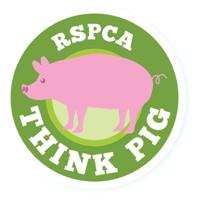Oink, Oink, Oink!
Pigs have been on my mind a lot lately. It might have something to do with the number of requests I've had for bacon sarnies ('bacon sandwich' in British slang) and BLTs at work, but I think it mostly has to do with the early morning news I heard some time ago that the State of Tasmania has decided to phase out the use of sow pens by 2017. Subsequently, the Australian supermarket chain Coles announced that they would stop selling pork products produced by sow stall-using farms by 2014, which prompted the Tasmanian government to push up the ban's date.
Photo courtesy of ABC Rural News. Photographer: Gabrielle Chan
If you've never heard of sow stalls and have little or no knowledge about pig farming, the following might come as a big shock: in intensive pig farming, sows (female pigs) are kept in narrow pens barely big enough to allow for the animal to stand up or lie down on its side. There is no room for any other movement, they cannot even turn around to face another direction. When sows give birth to their piglets, they are moved to a farrowing stall that allows them to lie on their side for nursing, however, the babies are not actually in the same pen: they are separated from their mother by metal bars, supposedly to protect them from being crushed by the sow, should she try to change positions. Pigs are extremely social, intelligent animals, and it has long been deemed that such treatment is cruel and unnecessary for raising pigs for meat. Also, these stalls do not allow for the pigs' natural instinct to root around and to wallow in mud and dirt, a habit they use to protect their skin from insect pests and skin diseases. The UK banned the use of sow pens in 1999, but they are still widely used in the rest of the world, including in Canada and the US.
So the RSPCA has launched a new campaign to help improve the living conditions of pigs raised in Europe. Called 'Think Pig', the campaign is asking for consumers to consider the pig's welfare when purchasing pork products. While Think Pig (check out their Facebook page!) is aimed at UK consumers, it does send an important message for meat eaters around the world: as consumers, we have the power to demand for more ethical products. Simply asking pointed questions like where fish comes from has pushed most major grocery chains in Canada to voluntarily seek out sustainable fish. If you eat pork, ask your grocer to look into their suppliers' practices. If they are unwilling to budge, and if it is within your budget, make friends with another butcher, and buy ethically raised pigs from a small farm.
Improving the pigs' welfare is not only good for the pigs themselves, it is also good for the pig farmers. Did you know that most pig farmers in Canada lose money when they bring their pigs to slaughter? That pig anatomy is not taught in any veterinary school across Canada? Treating a sick or injured pig would cost more than dispatching it to the slaughterhouse, so pigs are not on the curriculum. The current Canadian government is actually paying farmers to reduce the size of their herds or even to get out of pig farming altogether in the hopes that it will stem the pork industry's financial hemorrhage. Better living conditions for the pigs would translate into higher selling prices, and therefore profit for the farmer.
Yes, better treatment for pigs will mean higher prices for consumers. But do we really need to eat so much meat? Should we even eat cheap meat? Wouldn't we feel better knowing that the animal we eat had a good life, and that the farmer who raised it had a fair wage for his work?
So the next time you pick up a packet of bacon, think pig.




I am not sure about North America, but in Australia you can buy Free-Range pork and bacon! I think it is organic too :D
ReplyDeleteThat's great news! And very soon, you will be able to get sow-pen-free pork too!
ReplyDeleteOne can purchase free-range, hormone- and antibiotic-free, organic pork in North-America, but it remains a 'boutique' product, mostly available in specialized butcher shops.
Though some big-name brands do offer such products, unless the pork is from a bonafied small farm, it is still likely to be from a pig raised in a sow-pen, even if it is 'organic'. Unfortunately, the 'organic' label does allow for quite a bit of leeway when it comes to the animal's living conditions in North America. Its feed and medication are strictly regulated, but not its pen size.
Until stricter regulations are put in place, many pig farmers in NA and SA will continue to harbour the belief that industrial pig farming require unethical living conditions.
Funny that, considering that the UK's pig farms produce a lot of pork under better living conditions...